Muti conducted over 3,000 choristers at the Ravenna Festival's special edition of the Roads of Friendship, Cantare amantis est (Singing is for those who love).
Photos by Silvia Lelli & Marco Borrelli
Since his last appearances with the Chicago Symphony Orchestra while leading its 2025 U.S. Winter Tour, Riccardo Muti has been leading sold-out concerts across Europe and in Japan, directing such distinguished ensembles as the Vienna Philharmonic, London Philharmonia, Berlin Philharmonic, the Cherubini Orchestra and the Tokyo Spring Festival Orchestra — all with which the CSO’s Music Director Emeritus for Life has had significant relationships during his career.
February 14-March 2 | 10 Concerts with the Vienna Philharmonic
In February and early March, Riccardo Muti conducted the Vienna Philharmonic in Graz, Vienna and Milan, as well as New York City for its annual three-concert residency at Carnegie Hall, where he had recently led the CSO during the 2025 Winter Tour. The first of three programs, performed in each of the cities, included Schubert’s Tragic Fourth Symphony and Bruckner’s Seventh. The subsequent performances included Catalani’s Contemplazione, Stravinsky’s Divertimento from The Fairy’s Kiss and Schubert’s Symphony No. 8 (Unfinished) as a second program and on the final night in New York, Mozart’s Jupiter Symphony and Dvořák’s New World Symphony.
“Recent performances at Carnegie Hall, under the Neapolitan-born conductor’s baton, revealed the lasting power and precision of the storied ensemble.” The Wall Street Journal
“In January, Muti toured with the Chicagoans to Carnegie; with these Vienna concerts, his winter in New York has felt like a victory lap.” The New York Times
Riccardo Muti conducting Verdi's Requiem in London with the Philharmonia, where he was music director from 1972 to 1982.
© Philharmonia Orchestra, Mark Allan
March 27 | Verdi’s Requiem in London
On March 27, Muti made a highly anticipated return to conduct Verdi’s Requiem with the London Philharmonia, where he served as principal conductor from 1972 to 1982, succeeding Otto Klemperer. As the Philharmonia prepared to celebrate its 80th anniversary, Muti’s performance — his first with the Philharmonia in 15 years — was one of the highlights of London’s musical calendar. A distinguished cast of soloists joined the Philharmonia Orchestra and Chorus with soprano Mary Lys, mezzo-soprano Elīna Garanča, tenor Piotr Beczała and bass William Thomas.
“A lifetime of study and experience was poured into this performance. I cannot recall the Philharmonia sounding better.” Bachtrack
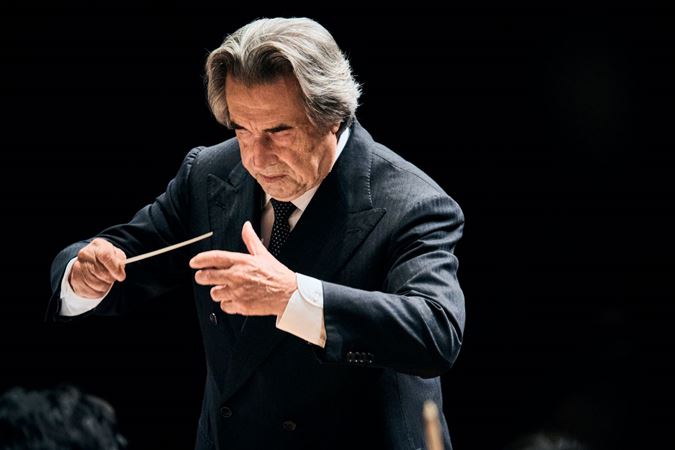
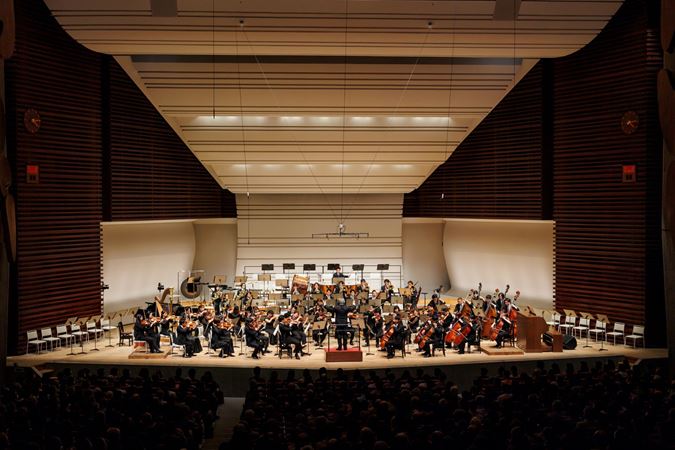
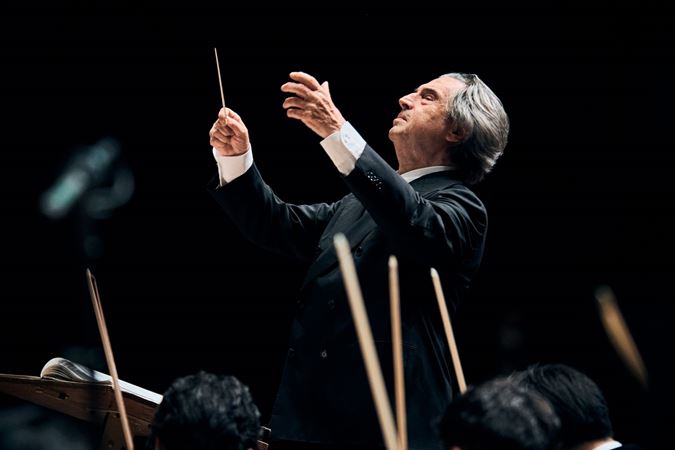
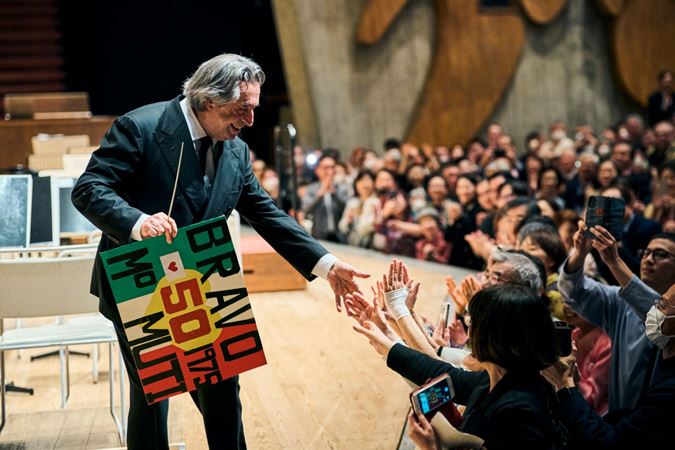
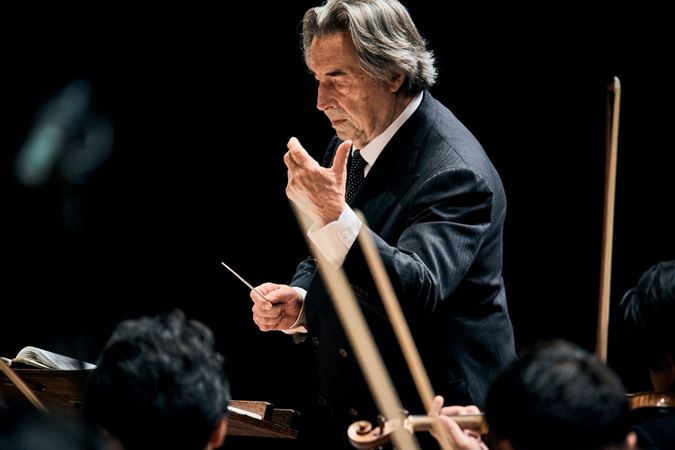
April 11-12 | A Return to the Tokyo Spring Festival
In April, Muti conducted at Tokyo’s 40-day Spring Festival, which takes place during the peak of cherry blossom season in the city’s cultural center, Ueno Park, which includes the Bunka Kaikan concert hall (where Muti and the CSO performed together in 2016 and 2019) as well as multiple museums, temples and pagodas. Having recently led the fourth Italian Opera Academy in Tokyo this past September, Muti returned to conduct the Tokyo-HARUSAI Festival Orchestra in two concerts of Italian orchestral works by Verdi, Mascagni, Leoncavallo, Giordano, Puccini, Catalani and Respighi.
Riccardo Muti conducts the Berlin Philharmonic's Eurpakonzert at Bari's Teatro Petruzzelli
Courtesy of Riccardo Muti Music
May 1-2 | On Tour with the Berlin Philharmonic
In May, Muti conducted the Berlin Philharmonic in two historic performances in Italy. May 1 was the orchestra’s Europakonzert, an annual concert that marks its foundation in 1882. “By performing on May 1st of each year in a different location of importance to European culture,” stated Hans-Dieter Lucas, the German Ambassador to Italy, “the Berlin Philharmonic conveys an important message: music can — and must — make a contribution to peaceful coexistence and the unity of Europe.” The concert, marking the orchestra’s first appearance in Bari at the Teatro Petruzzelli, was broadcast to 80 countries and included Brahms’ Second Symphony, Rossini’s William Tell Overture and Verdi’s The Four Seasons from I vespri siciliani. This was the second Europakonzert that Muti has conducted in his career; the first was at the Teatro San Carlo in Naples in 2009. The performance in Bologna was the Berlin Philharmonic’s first concert in that city since 1951. It took place at the PalaDozza, typically an indoor sporting arena, to accommodate nearly 4,000 spectators, who gave Muti and the Berlin Philharmonic a thunderous and prolonged standing ovation at the end of the concert.
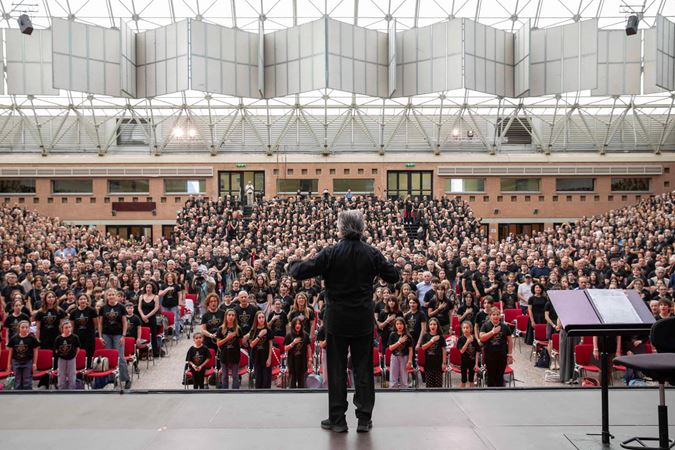
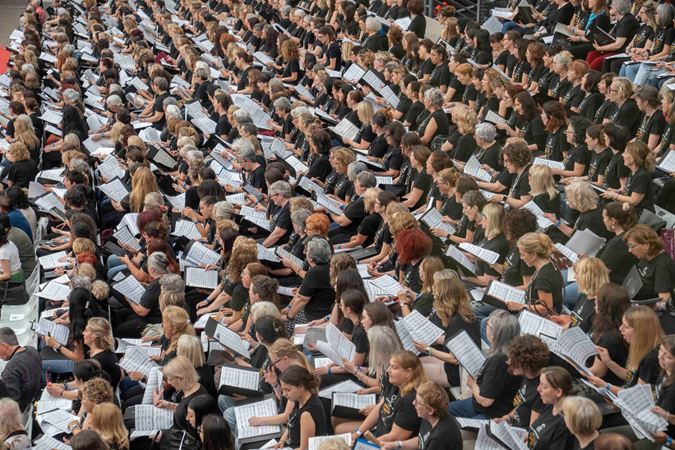
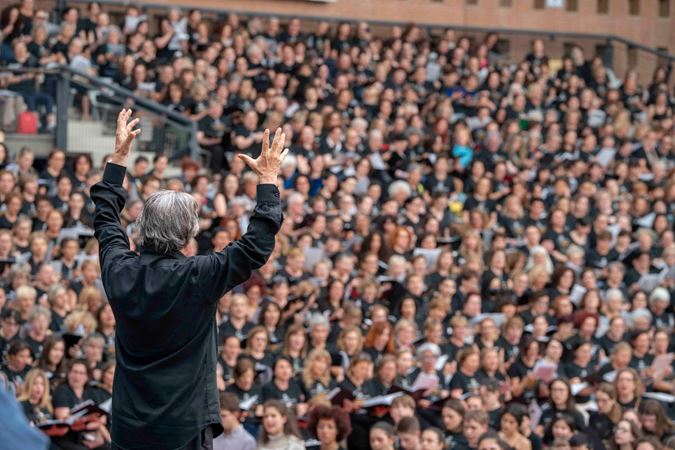
May 31 & June 1-2 | Ravenna Festival
This past week, Riccardo Muti opened the Ravenna Festival with the Orchestra Giovanile Luigi Cherubini, which he founded, performing Beethoven’s Coriolan Overture, Mozart’s Violin Concert No. 4 in D major, with Giuseppe Gibboni as soloist, and Beethoven’s Seventh Symphony at the Palzzo Mauro de André.
On June 1 and 2, he led Cantare amantis est (Singing is for those who love), a special edition of the annual Roads of Friendship concert that borrows the words of Saint Augustine for the title of two-days of classes, rehearsals and in-depth analysis led by Muti of three of Verdi’s great opera choruses: “Va’ Pensiero” from Nabucco, “Patria oppressa!” from Macbeth and “Jerusalem! . . . Jerusalem” from I Lombardi alla prima crociata. Over 3,100 choristers participated representing 106 choirs from Rivarolo Canavese in Piedmont to Corciano in Umbria, from Venice to Lavarone (Trento) and of course also from Naples and Molfetta (Muti’s hometowns), plus 1,202 choir members who registered individually, from the age of 4 to 87 years old, came together for two days to sing in a spirit of supreme harmony, brotherhood, friendship and peace. The Ravenna Festival described this year’s unique Roads of Friendship as an occasion where “all the voices of our country, regardless of age or experience, will come together under Maestro Muti to embark on a unique journey through choral music, sharing a passion for music and bel canto singing some of Verdi’s most beloved choral works under the Maestro’s baton, trying to imagine a world where peace knows no boundaries.”


